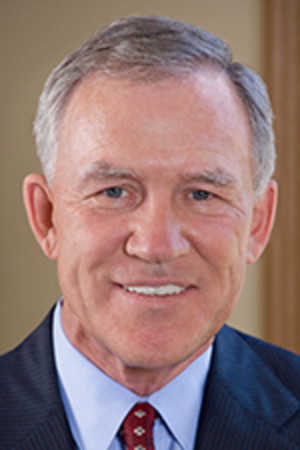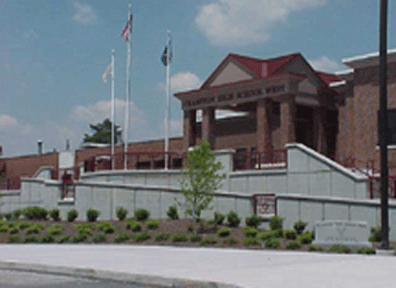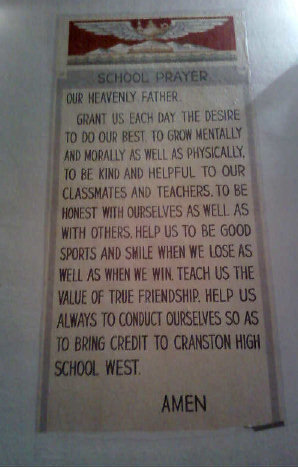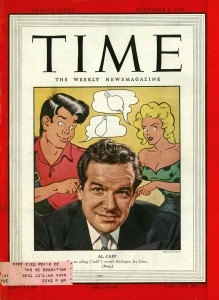The American Civil Liberties Union has threatened to sue Cranston High School West in Rhode Island — warning that resisting the no-religion agenda of the ACLU can be extremely expensive.

So, a local alumnus who happens to be a First Amendment attorney stepped up and said he’d defend the school for free. Joseph V. Cavanagh Jr. told the Cranston school board that he wouldn’t charge his alma mater a cent — and furthermore, he had lined up financial backing from the Becket Fund, Washington, D.C., public interest group dedicated to defending religious expression. The fund is named after history’s Thomas Becket who died rather than give in to King Henry II’s attempts to manipulate the church.
How had the school violated students’ civil liberties? Since 1963, a banner has born this message, written 40 years ago by a member of the Student Council:
Our Heavenly Father,
Grant us each day the desire to do our best,
To grow mentally and morally as well as physically,
To be kind and helpful to our classmates and teachers,
To be honest with ourselves as well as with others,
Help us to be good sports and smile when we lose as well as when we win,
Teach us the value of true friendship,
Help us always to conduct ourselves so as to bring credit to Cranston High School West.
Amen
The ACLU cannot tolerate such public references to “Our Heavenly Father” or the public utterance of “Amen” — never mind that banishing such religious speech is in itself a violation of civil liberties, a principle on which Rhode Island was founded.
“If he were here today, Roger Williams, who founded Providence in 1636, might think he was back in tyrannical Massachusetts, from which he had fled,” writes columnist Robert Knight for the Daily Caller online newsite.
The ACLU first threatened Cranston school officials in July 2010 with a threatening letter from the ACLU of Rhode Island’s Executive Director Peter Brown. He said stating that one person was “extremely concerned and troubled” by the banner. The school board discussed the letter, then on March 7 in a public meeting attended by 150 residents, voted 4 to 3 to keep the banner. The Providence Journal newspaper notes that the board also considered a petition with more than 4,000 names backing the banner.

In response, the ACLU warned the school that fighting the matter would be expensive and unwise considering “the school district’s ongoing and severe budgetary problems, which has led to layoffs and program cuts.”
“Basically, ‘We’ll make you even poorer! You can’t afford this!’ the ACLU screamed,” writes Knight.
So Cranston grad Cavanagh stepped forward. A Harvard graduate who got his law degree from Boston College, he is the managing partner and head of civil litigation and trial practice for the local law firm Blish and Cavanagh. He has worked on First Amendment cases for local print media and broadcast companies and was named a Rhode Island and New England Super Lawyer from 2007 to 2010.
A precedent must be set, says Cavanagh, who is ready to take the matter all the way to the U.S. Supreme Court. And community leaders are behind him.

“The desire to scrub every reference to God and religious faith from public life, including our schools, is tiresome and irritating,” said Roman Catholic Bishop Thomas J. Tobin. “And in fact it creates another pseudo-religion, secularism, that other people are forced to endure. The ACLU should avoid these silly little squabbles and move on to other more important issues where civil liberties are really threatened.”
The ACLU has a historical hostility toward what the Declaration of Independence describes as “certain unalienable rights” with which Americans are “endowed by their Creator.” The ACLU brags that it is ‘nation’s guardian of liberty, working daily in courts, legislatures and communities to defend and preserve the individual rights and liberties that the Constitution and laws of the United States guarantee everyone in this country.”
That is, unless you are a Christian.
The ACLU insists that “the message of the Establishment Clause is that religious activities must be treated differently from other activities to ensure against governmental support for religion.”
“Utter hokum,” says Knight. The First Amendment’s Establishment Clause says nothing of the sort. Its message is abundantly clear, requiring severe distortion to twist it to fit the ACLU’s agenda. It states: “Congress shall make no law respecting an establishment of religion, or prohibiting the free exercise thereof.”
Making a high school in Rhode Island take down a 40-year-old banner made by a student is exactly that — a violation of the guarantee of “free exercise” of our faith.

